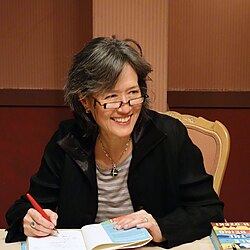Ruth Ozeki Quote
There's the fact of her being a hundred and four years old. I keep saying that's her age, but actually I'm just guessing. We don't really know for sure how old she is, and she claims she doesn't remember, either. When you ask her, she says, Zuibun nagaku ikasarete itadaite orimasu ne. .... (footnote) Zuibun nagaku ikasarete itadaite orimasu ne -- I have been alive for a very long time, haven't I? Totally impossible to translate, but the nuance is something like: I have been caused to live by the deep conditions of the universe to which I am humbly and deeply grateful. P. Arai calls it the gratitude tense, and says the beauty of this grammatical construction is that there is no finger pointed to a source. She also says, It is impossible to feel angry when using this tense.
There's the fact of her being a hundred and four years old. I keep saying that's her age, but actually I'm just guessing. We don't really know for sure how old she is, and she claims she doesn't remember, either. When you ask her, she says, Zuibun nagaku ikasarete itadaite orimasu ne. .... (footnote) Zuibun nagaku ikasarete itadaite orimasu ne -- I have been alive for a very long time, haven't I? Totally impossible to translate, but the nuance is something like: I have been caused to live by the deep conditions of the universe to which I am humbly and deeply grateful. P. Arai calls it the gratitude tense, and says the beauty of this grammatical construction is that there is no finger pointed to a source. She also says, It is impossible to feel angry when using this tense.
Related Quotes
People lack morals, good moral character is important in every aspect of your life. Honesty and Integrity opens the door. Your character allows others to see you for who you truly are. Make your first...
About Ruth Ozeki
